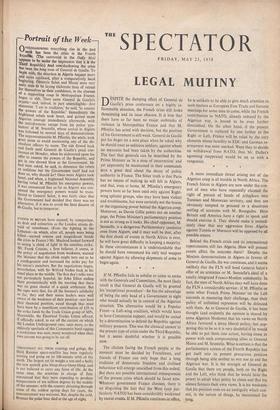LEGAL MUTINY
•D ESPITE the damping effect of General de Gaulle's press conference on a highly in- flammable situation, the French crisis still looks threatening and its issue obscure. It is true that there have so far been no major outbreaks of violence in Metropolitan France and that M. Pflimlin has acted with decision, but the position of his Government is still weak. General de Gaulle put his finger on a sore place when he asked why he should treat as seditious soldiers, against whom no measures had been taken by the authorities. The fact that generals can be described by the Prime Minister as 'in a state of insurrection' and yet apparently be maintained in their commands says a great deal about the decay of public authority in France. The bitter truth is that Paris has no means of making its will felt in Algiers, and that, even at home, M. Pflimlin's emergency powers have so far been used only against Right- wing splinter groups, who may have been violent and troublesome, but were certainly not the brains or the organising power behind the Algerian coup. Moreover, as Darsie Gillie points out on another page, the Prime Minister's parliamentary position is not as strong as it looks. His chief opponent, M. Soustelle, is a dangerous Parliamentary spadassin even from Algiers, and it may well be that, after the first shock of events in North Africa is over, he will have great difficulty in keeping a majority. In these circumstances it is understandable that he should have renounced his only real weapon against Algiers by allowing shipments of arms to begin again.
If M. Pflimlin fails to subdue or come to terms with the Generals and Committees, the most likely result is that General de Gaulle will be granted his 'exceptional procedure'—he has the advantage of being the only head of a Government in sight who would actually be in control of the Algerian situation. The alternative would be a Popular Front—a Left-wing coalition, which would have to have Communist support, and would be united . by a determination to defend the Republic against military pressure. This was the classical answer to the present type of crisis under the Third Republic, but it seems doubtful whether it is possible now.
The choices facing the French people at the moment must be decided by Frenchmen, and friends of France can only hope that a long tradition of democratic freedom and civilised behaviour will emerge unscathed from this ordeal. But there are possible international consequences of the present crisis which should be faced now. Whatever government France chooses, there is no disguising the fact that the West (and par- ticularly NATO) has been considerably weakened by recent events. If M. Pflimlin continues in office, he is unlikely to be able to give much attention to such matters as European Free Trade and Summit meetings for some time to come, while the French contribution to NATO, already reduced by the Algerian war, is bound to be even further diminished. On the other hand, if the present Government is replaced by one farther to the Right or Left, France will be ruled by the very elements whose hostility to EDC and German re- armament was most marked. Were they to decide on withdrawal from NATO, then Mr. Dulles's agonising reappraisal would be on us with a vengeance.
* *
A more immediate threat arising out of the Algerian coup is of trouble in North Africa. The French forces in Algiers are now under the con- trol of men who have repeatedly claimed the right of pursuit of bands of fellagheen into Tunisian and Moroccan territory, and they are obviously tempted to proceed to a disastrous settling of accounts with M. Bourguiba. Here Britain and America have a right to speak and should exercise it. They should make •it immed- iately clear that any aggression from Algeria against Tunisia or Morocco will be opposed by all possible means.
Behind the. French crisis and its international repercussions still lies Algeria. How will present events affect the outcome there? Despite the Moslem demonstrations in Algiers in favour of General de Gaulle, the war continues, and it seems unlikely that the FLN will heed General Salan's offer of an armistice or M. Soustelle's ideal of a totally integrated Franco-Moslem community. In fact, the men of North Africa-may well have done the FLN a considerable service : if M. Pflimlin or some other French Prime Minister on the Left succeeds in mastering their challenge, then their policy of unlimited repression will be defeated with them. As to General de Gaulle, it has been thought (and evidently the opinion is shared by some Algerian Moslems) that his views on North Africa favoured a more liberal policy; but sup- posing this to be so it is very doubtful if he would be able to put them into action, having come to power with such compromising allies as General Massu and M. Soustelle. What is certain is that the parliamentary system of the Fourth Republic has got itself into its present precarious position through being able neither to win nor to end the Algerian war. It is the strength of General de Gaulle that there are people, both on the Right and the Left, who think that he would have the power to adopt what policy he chose and that his silence favours their own views. It is his weakness that his position rests on an ambiguity which can- not, in the nature of things, be maintained for long.


































 Previous page
Previous page